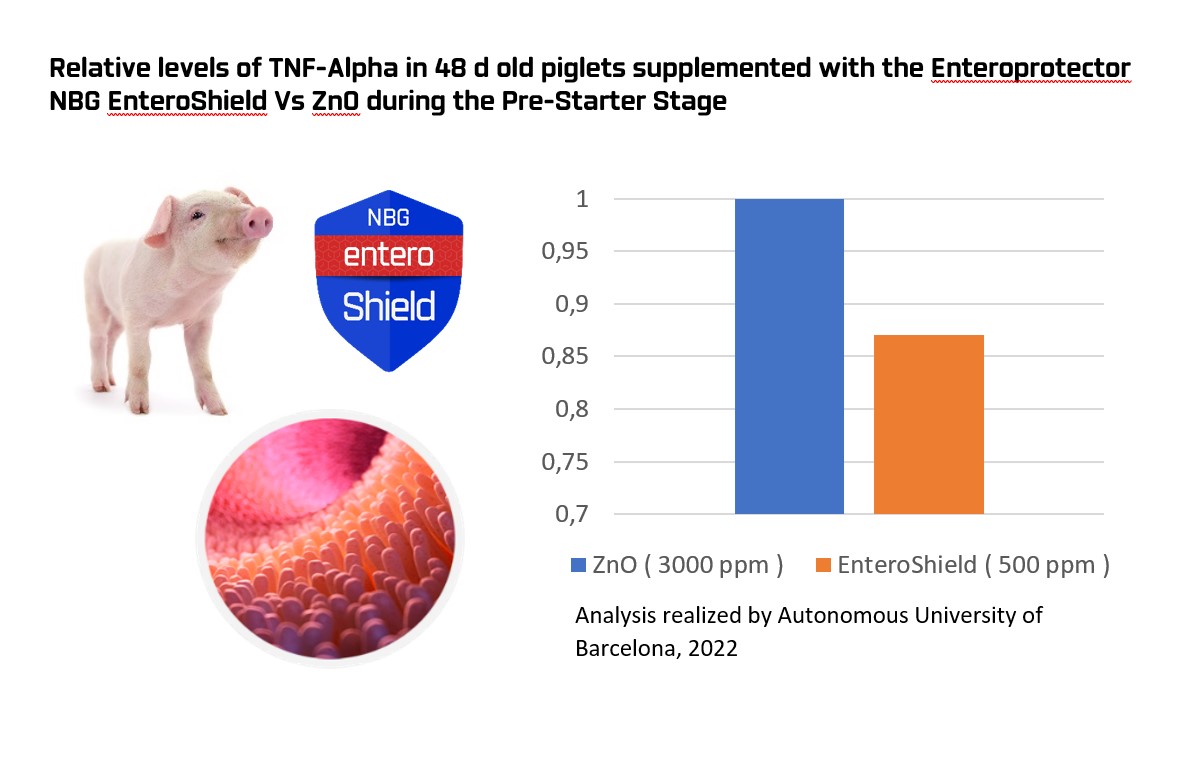Tumoral Necrosis Factor – Alpha (TNF-Alpha)

Dear colleagues,
Years ago, one of the few tools we had to objectively assess intestinal health improvement in livestock animals was intestinal mucosal histology, an invasive technique that required the slaughter of animals and assessed the relationship between villus length and crypt depth. Since then we have been improving the techniques to tools such as gene expression that show quite accurately the health status of the animal, but the same gene expression measures the expression of several biomarkers that assess intestinal health, inflammatory status and metabolic stress of the animal such as interleukin-1beta, interleukin-6, Pig-Map, C-Reactive protein, TNF-Alpha (Tumor Necrosis Factor Alpha).
This week we wanted to review the characteristics of one of the biomarkers that have helped us the most throughout many developments, TNF-alpha.
TNF-alpha is an inflammatory cytokine produced by macrophages, lymphocytes, mast cells and neutrophils when activated by interleukin-1 or bacterial endotoxins.
It is also produced as a transmembrane protein, as well as by smooth muscle cells in response to injury.
The main functions of this cytokine are signaling cell apoptosis, indicating which cells should be destroyed, and stimulating the secretion of other proinflammatory molecules.
These actions are important both to fight a pathogen and to eliminate cancer cells, but the immune response is based on balance, so if we have an infection and/or chronic inflammation of a tissue, for example during intestinal malabsorption syndrome, we will have unjustifiably high levels of TNF-alpha and other proinflammatory factors that will impact the inflammatory state of the whole organism.
In addition, TNF-alpha (also known as cachectin) decreases the animal’s appetite and increases CRH levels, which in the end also increases cortisol and adrenaline levels in the blood with all that this represents, such as immunosuppression or protein catabolism.
Another fact to take into account is that inflammation and elevated levels of TNF-alpha in the intestine alter the ability to absorb nutrients, for example:
– Elevated TNF-alpha levels decrease the receptor necessary for vitamin C absorption.
– Elevated levels of TNF-alpha decrease the expression of butyrate transporters.
– Phosphate absorption decreases when TNF-alpha is elevated in the intestines.
Having unusually high and constant levels of TNF-alpha indicates impaired intestinal health with a tendency to immunosuppression, de-biosis and malabsorption syndrome.
As the cover of this article we are pleased to show an analysis from the Autonomous University of Barcelona comparing TNF-Alpha levels in piglets that consumed our enteroprotector NBG EnteroShield Vs an enteroprotector of undisputed potency such as Zinc Oxide at a dose of 3000 ppm during the pre-starter stage.
Although the positive effect of Zinc Oxide on intestinal health is indisputable… our product outperforms its effect at a productive and metabolic level.
Finally, we attach an interesting article that reviews the role of TNF-Alpha in intestinal health.
Entjoy the article.

